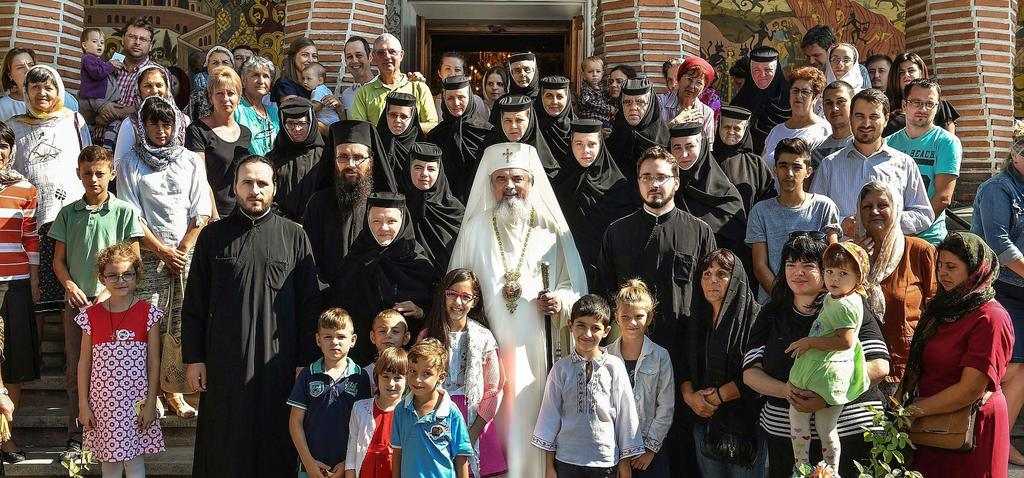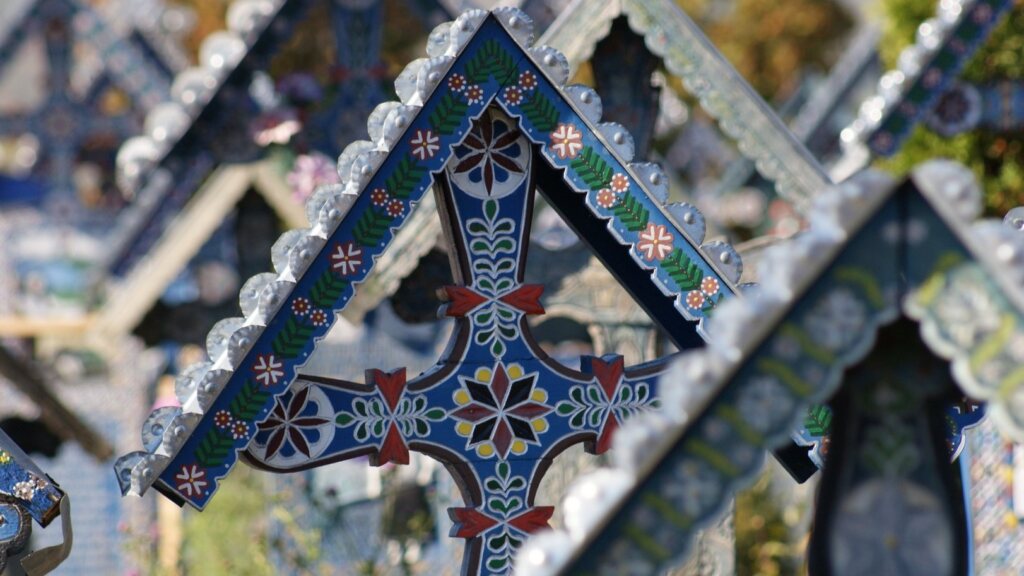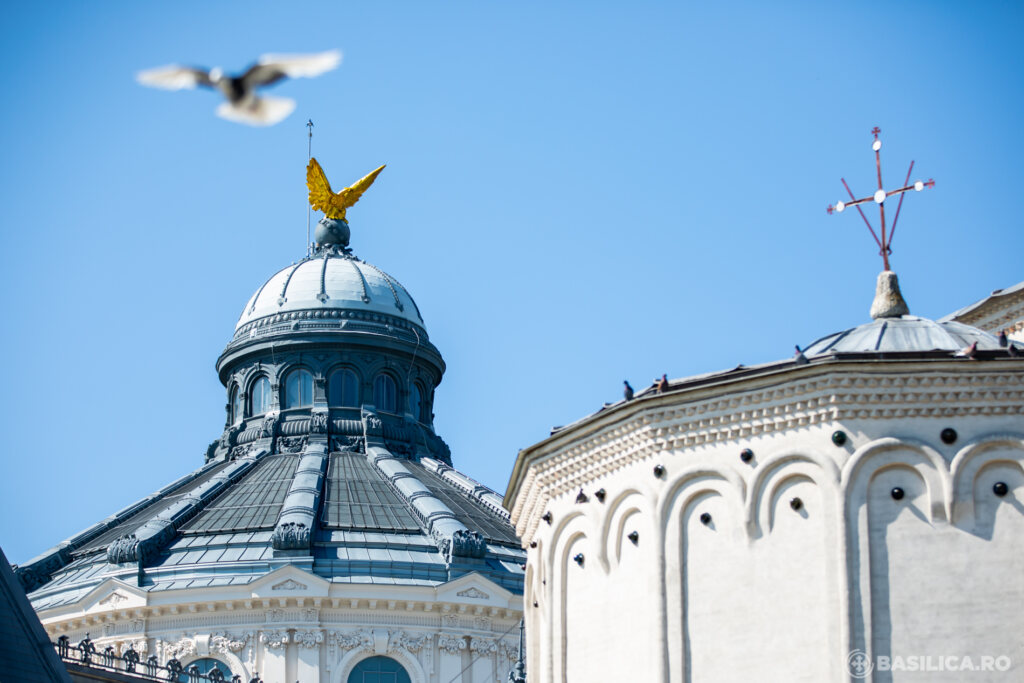His Beatitude Daniel, Patriarch of the Romanian Orthodox Church, visited on the Sunday after the Exaltation of the Holy Cross, 20 September 2015, the monastic community of Samurcășești Monastery, in Ciorogârla, Ilfov county, where he participated in the Divine Liturgy.
In the sermon delivered at the end of the Divine Liturgy, the Patriarch of Romania referred to the spiritual teachings drawn from the evangelical parable read in all places of worship during the Divine Liturgy: “Our Lord Jesus Christ teaches us that human’s first and greatest concern should be the salvation of the soul. Only the human being was created in the image of the Eternal and Living God. All other creatures are created by God, but they are not persons. But the human person is created in the image of the Divine Persons, in the image of the Father, of the Son and of the Holy Spirit. The divine Persons are Unlimited and Eternal in Their life, therefore the human being created in the Image of the divine Persons is called to eternal love and life. This is why a human’s first concern, during the earthly life, has to be the pursuit of eternal life. This eternal life is acquired by uniting the limited and mortal human being with the Unlimited and Immortal God”.
His Beatitude showed that in today’s Gospel, our Saviour Jesus Christ addresses four exhortations that are very important for a Christian’s life in the world: “First, He says: “Whoever wants to be my disciple..”, secondly: “must deny themselves.”, thirdly: “take up their cross”, and fourthly: “follow me.” If we understand these four exhortations as related to the mystery of the Holy Cross, they form a cross. The four exhortations represent spiritual stages in the human’s life which lead to eternal life, to our union with God.
A person’s freedom is an essential component part of his or her dignity
“First, we see how much Christ, the Lord, respects the human’s freedom. He does not force anybody. He calls, but does not constrain. This great appreciation of human freedom by God is explained by the fact that a person’s freedom is an essential component of his or her dignity. But Christ our Saviour wants to draw our attention that whoever wants to follow Him will be saved, otherwise they will lose salvation. Thus, the human being is free to unite with God or separate from Him forever. This is why, God does not send anybody to heaven or hell by force, but observes the human’s freedom. Why should we follow Christ? The greatest gift that the faithful soul can wish for is eternal life because humans are created in the Image of the Most Holy Eternal Trinity. Whenever we follow Christ we do not follow a mortal human, a political leader, a philosopher or a great scholar, but when following Christ, we follow the Eternal God”, His Beatitude Daniel said.
Self-denial does not mean depersonalisation, but renewal of the person
The Patriarch of Romania also spoke about the significance of the second exhortation of the Saviour: “What does this self-denial mean? Is it a self-denial understood as depersonalisation? No! The self-denial that Jesus Christ, our Saviour, asks for is not depersonalisation, but a renewal of the person. It refers to changing our nature and the way of living, that is to no longer live egotistically, thinking only of ourselves, and think first of all of God, the Source of our life, and of those around us. In other words, self-denial means giving up the selfish or passionate self-loving in order to acquire the humble and sacred love of God and of fellow people. A human who denies him- or herself is not depersonalised, but his/her person starts to become similar to the Persons of the Holy Trinity who do not live only for themselves, but each Person of the Holy Trinity lives for the other two.”
The third exhortation of our Saviour Jesus Christ refers to the cross and taking it up. In this regard, His Beatitude Patriarch Daniel explained: “From the material point of view, the cross is an object made of two segments, a vertical and a horizontal one. Thus, we refer to the cross something that can be seen and touched. Today’s Gospel does not refer to a wooden cross or to any material other object carried on one’s back. When our Saviour Jesus Christ says: “take up their cross“, He refers to a spiritual cross. This is life’s cross, a difficult situation in life that we do not see with our physical eyes, but feel in our life. The Cross has many meanings in a human’s life. Spiritually, the cross can mean that we lack something, that we aspire to infinite values and ideals, but we quickly acknowledge that our power is limited and we are mortal. The Cross can also be a long suffering or a failure that marked our life. For some people, the cross can mean a sad childhood of an orphan receiving no love from the parents, an unquiet youth, full of troubles and trials, or a misfortunate marriage. For other people, the cross may represent permanent poverty, an incurable disease or a hard situation that they try to escape from with much effort. However, for many people the cross may represent a material failure in life, but which can be transformed into a spiritual accomplishment. There are disabled people who cannot write with their own hands but learned how to write with their feet, or who were blind but wrote books. One of these people was father Teofil Paraian from Sâmbăta Monastery who was born blind and lived all his life being blind. But father Teofil Paraian delivered lots of beautiful speeches and wrote over twenty books. His physical blindness was a cross from a perceptible point of view, but he changed it into a spiritual victory”.
We reach the joy of the union with God through the cross of suffering carried together with Christ
The fourth exhortation of our Lord Jesus Christ regarding following Him, refers to the fact that we should not carry the cross alone, because we cannot do it, the Patriarch of Romania indicated: “We cannot endure an incurable disease with patience and spiritual peace unless we continuously request God’s help through prayer. The Crucified and Risen Christ, who carried the Cross until death, but who defeated death through Resurrection, helps the human who is carrying the cross of suffering to change suffering into victory, to come closer to God, to cleanse us from our sins, to become more merciful, forgiving and understanding. Thus, we reach the joy of the union with God through the cross of suffering carried together with Christ. The people who suffered a lot can better understand other people’s cross. Faced with the cross as suffering we can never be impartial. The humans who suffer a lot either come closer to God and to fellow people, or move away from God and from their fellow beings. These ones either rise up against God and quarrel with God, or pray more uniting with God”.
To end with, His Beatitude Patriarch Daniel offered several liturgical books to Samurcăşeşti Monstery in sign of appreciation and blessing.






